Great teams build great products, and great bands make great music — we can learn a lot from rockstars.
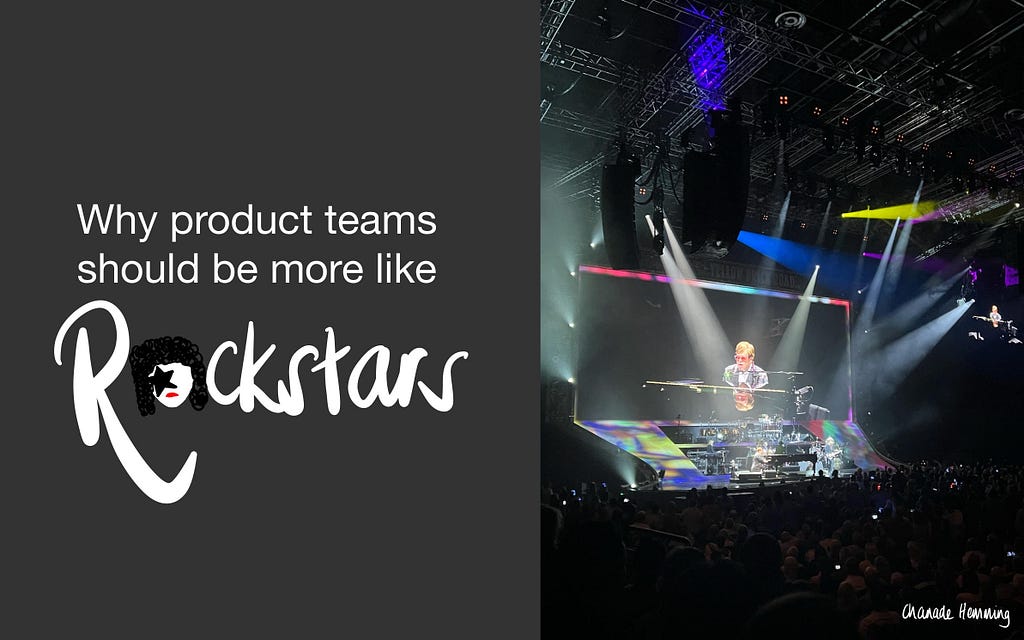
I was inspired to write this after a couple of concerts I went to, ‘farewell tours’ of KISS and Elton John. For my regular readers, you’ll know I love music, and how diverse my Liked playlist on Spotify is, so this should be no surprise seeing a mash-up of ‘I want to rock and roll all night’, ‘I’m a rocket man’.
KISS, led by Gene Simmons and Paul Stanley, and Elton John along with many of his band members, are 70+ years old, which means their careers have been nothing short of tremendous. Both were entertaining, but KISS, well, they were unbelievable with the performance they put on, it was hard to believe this was the end of the road tour*, I’m sure I’ve missed some truly awesome shows in the past.
*many KISS fans say there’s been many of these, and they keep coming back, so who knows — is this one any different?.
There’s something that keeps them going, of course they earn royalties for their work and can afford the very best of everything, but there’s something more, there’s passion, enjoyment and fun. How much fun and passion do you have in what you do? Not many people are lucky enough to earn, learn and be in a job they love, so how do we as leaders create an environment where teams enjoy it?
If you look at the work of Apple, and the focus of Jobs when he was driving the company to make innovative products, he said it so well:
“My passion has been to build an enduring company where people were motivated to make great products. Everything else was secondary” — Steve Jobs
And I couldn’t agree more with that statement.
You’re never too old to be great
There’s a lot of talk and focus on diversity in many ways, but not very often do we talk about age. Age brings life experience to the table and events / occurrences that the younger crowd hasn’t seen, felt or heard, which makes for laughter, wisdom as well as getting through hard times. 2023, has set a record for mentions of the ‘menopause’, which I am delighted by but also distraught at how slow society has been in the workplace to address and support women going through this, and educate those living with and around them to understand it. Tina T was performing all through it, her fans will have been huge for her, but what about your colleagues going through it? What environment are we creating to drive openness and trust to support?
I’m proud that in my functional team, and product teams we’ve got people that have just started out, some that have experienced the menopause (directly and indirectly), through to those where kids have left home and they’re enjoying their life in different ways. Great teams build products, and great bands make great music — age is 100% a factor to consider here. I mentioned KISS and Elton being 70+, and I couldn’t write about music legends, without the late Tina Turner who 69 at her final concert in 2009, she sure was still rolling then.
Laugh a little more
Rockstars are known for having fun right? And it’s pretty much proven that laughing is good for your health.
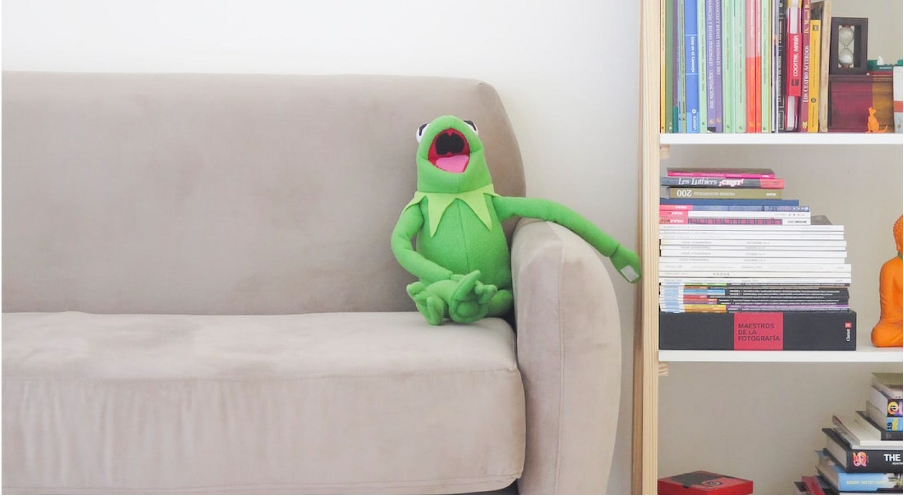
Remember the last time you laughed and how good it felt? Here’s some of the benefits of laughing (sourced mainly from HealthGuide.org, Feb 2023):
- Known to relax the whole body: “A good, hearty laugh relieves physical tension and stress, leaving your muscles relaxed for up to 45 minutes after”.
- Immune system booster: “Laughter decreases stress hormones and increases immune cells and infection-fighting antibodies, thus improving your resistance to disease”.
- Triggers endorphins, our feel good chemicals: “Endorphins promote an overall sense of well-being and can even temporarily relieve pain”.
- Can burn calories — I’m here for this, I mean not to get in the way of exercise, but if I could laugh all day for exercise I would: “10 to 15 minutes a day can burn approximately 40 calories — which could be enough to lose three or four pounds over the course of a year”.
- See the funny side of something, and lighten the load: “Looking at the funny side can put problems into perspective and enable you to move on from confrontations without holding onto bitterness or resentment”. — this one is easier said that done I’m sure.
- Laugh a little more, live a little more. Most people have had life experiences that make you say ‘life’s too short’: “A study in Norway found that people with a strong sense of humour outlived those who don’t laugh as much”.
All of the above makes for a great team, and great teams build great products. I laughed so much recently in a meeting that when I think back on it, I smile and laugh again — because moments like that stay with you. This was our weekly functional team meeting, we all gave our usual highlights/lowlights/weekend antics in another accent, and I’m telling you, you should try it.
Not only funny, but to me, this is trust, and the ability to be vulnerable with one another. This links to the first dysfunction of a team from the great Patrick Lencioni, author of ‘The Five Dysfunctions of a Team’.
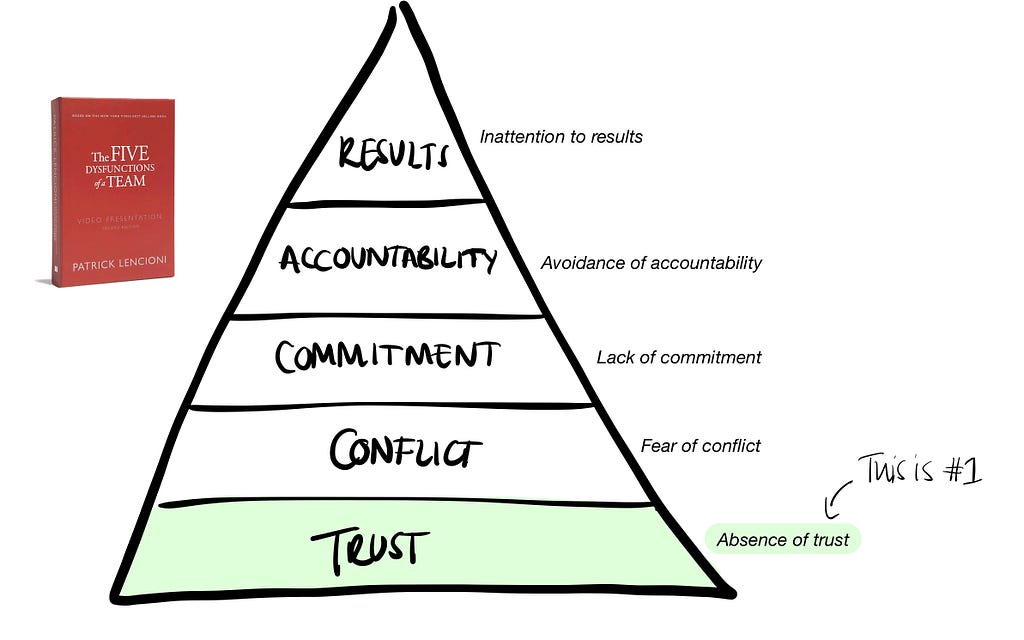
Building this trust outside of the core functional and product teams is critical too. When we laugh with our partners around the company who we’re building products for/with, we have greater relationships, easier conversations, and we win, and learn together.
Fun — rock and roll stars known for crazy parties
I’m not saying go rock and roll all night — sex, drugs, rock and roll as it were in the 70’s — I mean that would cause a very big HR problem. But make an effort to get beyond the work. Here’s some of the things that have worked a treat, for remote/hybrid and on-site teams.
Team building activities beyond ‘workshops’ — we climbed part of the Peak District, we got lost, we had fun, and it’s made us a better team today than we would’ve been if we didn’t do it. Teams have done mini-golf, darts, go-karting, general ‘bring a childhood game’ to the workshop for a breakout session.
Get moving — sports afternoons are a hit. We’ve had two now, so I can call it an annual tradition. On this day, we meet around 2:30pm at the park and play a bunch of games. People still remember last years, and they remember who was great at rounders, who fell over in the sack race, and who was a sore loser. Also, Yoga Wednesday’s — in fact, someone went so far to put in a time slot for Monday’s and Friday’s too, along with walking 1 to 1 meets.
Let’s not just ‘stay at the desk’…
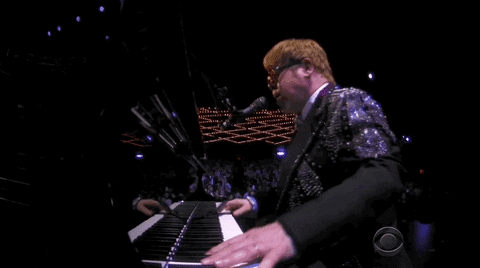
It’s good for the soul to get around, like KISS…
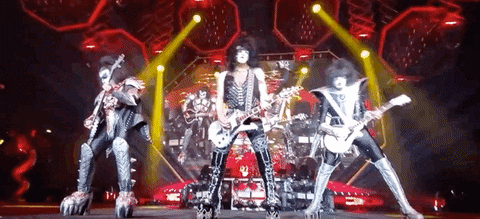
and work it like Tina…
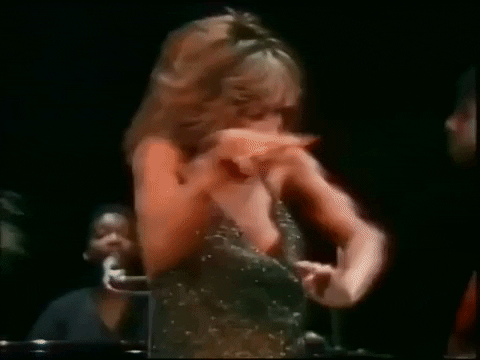
Make the day long workshop fun — workshops can be boring right? A lot of the time it means ‘locked in a room for the day’, so bring some fun. There’s nothing like some good icebreakers for doing introductions, or post-break warm ups to get people energised again. Here’s some of the things I’ve used in the past:
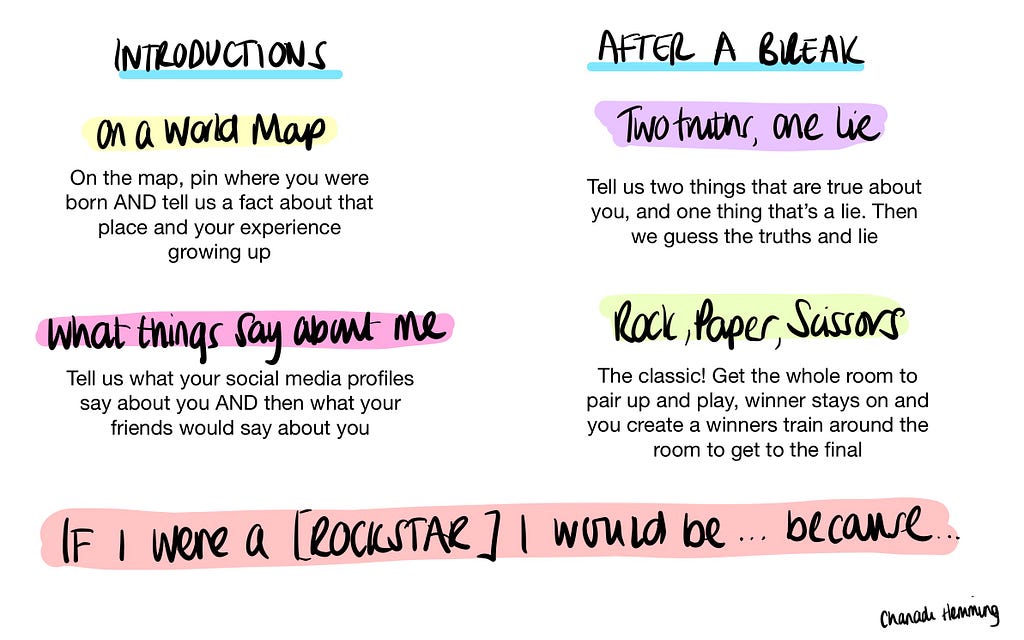
Great teams play in harmony
If you listen to any track from great bands / artists, you’ll hear the harmony across those teams. They all play their part, it’s a performance. Why isn’t demoing your product or running a discovery phase like that too? You’re working as a team, sometimes as the core product team, and other times with customers, partners etc, make it enjoyable.
In my world, if I think about ‘the band’, this is how I see it:
- Stage, lighting, effects and all that magic — that’s the crew setting the stage for the band. That’s the likes of data engineering, modelling and analytics engineering teams. Creating the space for the show to go on, and keeping it running smoothly throughout.
- Sound has to be our machine learning operations (MLOps) team, focusing on making the data products available in the wild, in the same way the sound comes out of the speakers, our data products are exposed to our customers whether that’s via an app they use, a frontline colleague and so on.
- Bass player and drummer has to be our software engineers, keeping the rhythm going, sometimes having a moment of solo on the drums, impressing everyone with the progress made — the rhythm changes, sometimes high tempo, smooth sailing, other times calm and in some cases, absolute chaos.
- On lead guitar for me is our analysts and data scientists. They’re the ones that bring wow moments, ‘I didn’t know that’, ‘well that’s helped’, as a customer ‘this is exactly what I love, this product knows me so well’… they are bringing insight to partners around the company, and mostly wowing people with what they’ve been able to do with the data.
- Lead singer is naturally the product manager in my opinion — we’re mostly the face of the team, the ones that bring it all together. We’re the ones…
Great products require us to take risks
Not every bet wins, not every track a band releases is a success, and sometimes, like Queen, you need someone like Freddie to go all in on Bohemian Rhapsody. This for me is the role of the product manager, and it’s an important one if you feel strongly about something, you’ve got to take risks. So the next time you feel this way, remember that Bohemian Rhapsody:
- Went on to be Number 1 on two occasions, 1975/76 and 1991/92 (following Freddie’s death).
- It was at Number 1 in 1975/76 for nine weeks, and 1991/92 for five weeks
- It remains the UK’s third best selling single of all time
- It was one of the longest tracks to hit the radio at the time, different and innovative to anything else
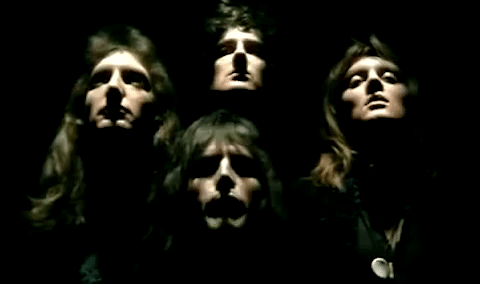
Particularly in the data space, not everything succeeds, there’s a lot of R&D, prototyping and experimentation. Executives assume that this magic ‘data’, ‘data science’ and now ‘GenerativeAI’ is a silver bullet. It’s not. And it requires 10’s of ideas and tries to get something that wins at times, but when something wins, it wins. Most importantly though, the data. Nothing will sing in harmony and be a #1 hit if the data is in a bad way. If it’s available, it must be usable which means it’s regularly updated, it has meaning, it is a single source for that thing.
Making great things isn’t easy, so make it enjoyable
Building great products is very similar to making great music. There will be fans, there will be critics, there will be days, even weeks where you’re wrestling with something to get it over the line, and you’ll feel like you won’t make it, but you will with the right team and tools. When it’s good it’s good, and when it’s bad it’s [insert word for feeling of frustration].
So to be more like rockstars…
You’re never too old to be great: It’s not just about the ‘young and hungry’ – we need people from various life stages, to create greatness. Also, the best product managers have squiggly careers, let’s celebrate that, as well as age in our hiring processes.
Laugh more, have fun: taking things too seriously, leads to a difficult environment, high stress levels, and most of all people not bringing themselves, their wholeselves to work – how do you expect to build trust then?
Great teams play in harmony: when you bring teams together, with focus on diversity of roles and people this leads to better ideas, ways of doing things, and much more. It promotes different thinking and approaches, which leads to greater outcomes.
Risks need to be taken: you’re not always going to win and that’s okay so long as you learn as a team. One of those risks will pay off and it’ll be amazing like ‘thunderbolt and lightning, very very frightening me. Galileo. Galileo’.
You don’t need to be a product manager or a data person to take something from this article. This should relate to any discipline, and I hope it did.
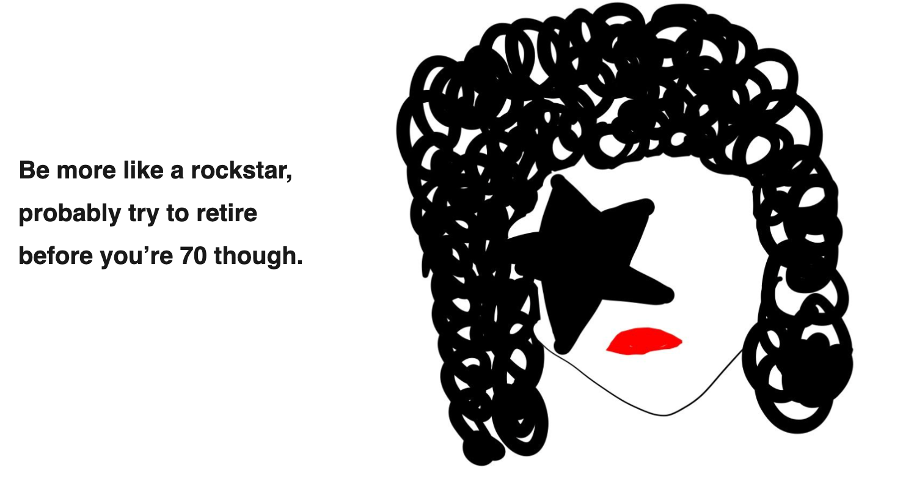
Why product teams should be more like rockstars (in most cases) was originally published in UX Collective on Medium, where people are continuing the conversation by highlighting and responding to this story.

Leave a Reply